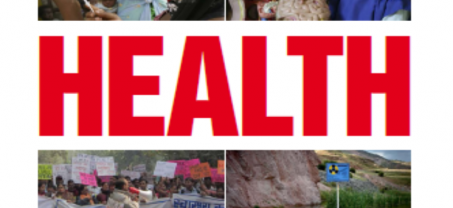- Echanges et mise en réseau
- Connaissance et apprentissage
- Plaidoyer
- Nos thèmes
Global Health Watch 4

Global Health Watch "With the world still battling the Ebola outbreak, the evidence of a clear link between the inability of affected countries to deal with the crisis and the collapse of public health systems is becoming stronger. Extreme poverty in the affected region, engendered by neo-liberal policies, further created the conditions for the rapid spread of the epidemic. This is the context that informs the contents of the 2014 Global Health Watch (GHW) report that was released today." The Network Medicus Mundi Switzerland documents the Press Release.
Published by Zed Books and now in its fourth edition, the GHW is widely perceived as the definitive voice for an alternative discourse on health.
“GHW4 integrates rigorous analysis, alternative proposals and stories of struggles and change to present a compelling case for the imperative to work for a radical transformation of the way we approach actions and policies on health. It is designed to question present policies on health and to propose alternatives through new analysis” says Sangeeta Shashikant, adviser to the Penang-based think-tank, Third World Network.
With contributions from more than 80 experts from across the globe, GHW4 addresses key issues in the health sector. Through its five sections, it covers diverse issues related to health systems and the range of social, economic, political and environmental determinants of health. GHW4 locates decisions and choices that impact on health in the structure of global power relations and economic governance and is complemented by the ' Watching' section that scrutinises global processes and institutions. The final section on 'Alternatives, Action and Change', documents inspiring stories of struggles and actions for change.
GHW 4 interrogates the current push for a particular kind of discourse on Universal Health Coverage (UHC). Says Prof. David Sanders, Professor Emeritus, School of Public Health, University of Western Cape, South Africa: "The current drift in health systems policy is dominated by a discourse of UHC that legitimises weakening of public systems and pursuit of private profit by purposefully reducing universal access to health care to insurance coverage. The case studies presented in GHW4 question the success of the UHC model; show the threat posed by UHC-led reforms to existing health systems and show the potential of models based on tax-funded system with universal entitlements to comprehensive services and participatory mechanisms".
GHW4 analyses the crisis in the World Health Organization (WHO), a crisis which came to a head in 2009 as it was borrowing against future revenues to maintain its operations. “The fundamental cause of WHO’s crisis is the freeze on core contributions and the consequent reliance on contributions tied activities which funders want to prioritize. However, the crisis in global health terms is the absolute inadequacy of WHO’s budget, equivalent to the cost of running a big hospital in Europe or the US. Compared to the cost of an epidemic like SARS or the Ebola crisis it is trivial. The current reforms in the WHO are in a direction that threatens to strengthen donors’ influence, and can only amplify the corporate influence on WHO’s agenda. WHO is at risk of losing its relevance” says David Legge, Professor of Public Health at La Trobe University, Australia.
A significant feature of this edition of the GHW is a special focus on Latin America. It captures the impacts and interlinkages between the wave of political and social change, health activism and alternative initiatives in the region. Not only are they inspiring stories, they are a reservoir of learning for the Global South.
GHW4 was coordinated by the People’s Health Movement (PHM), Asociacion Latino-americana de Medicina Social (ALAMES), Health Action International, Medico International, Third World Network (TWN) and Medact.